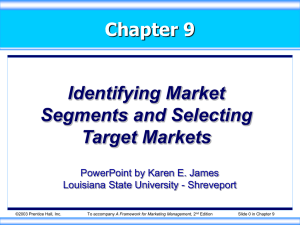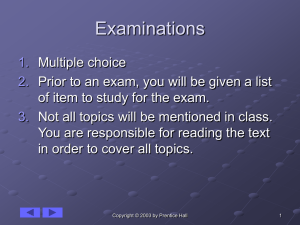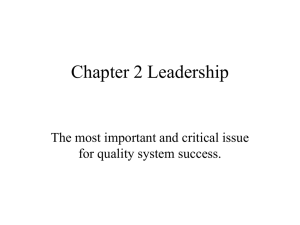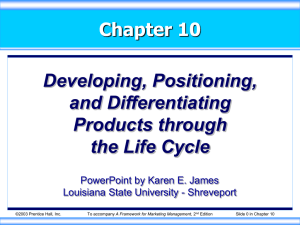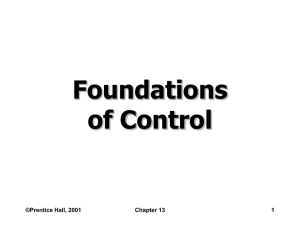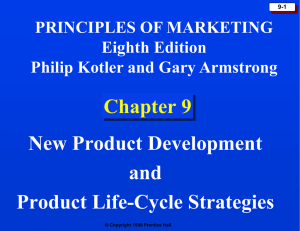Designing and Managing Integrated Marketing Communications
advertisement
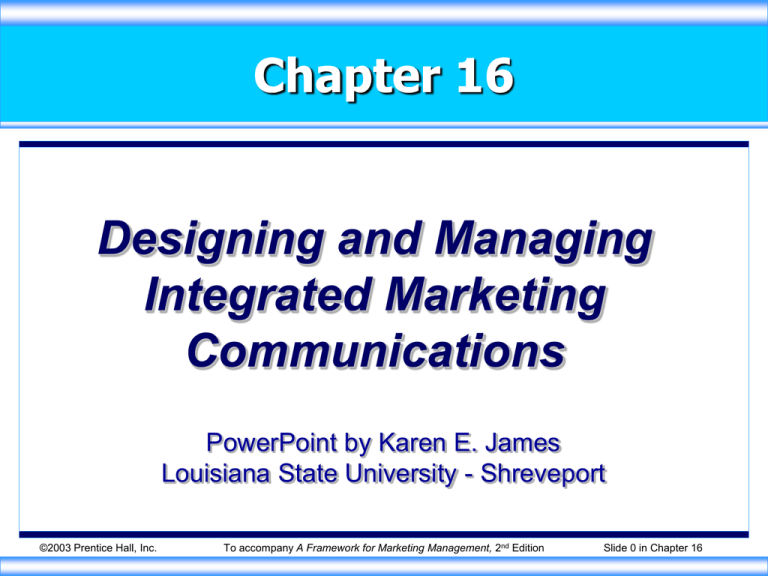
Chapter 16 Designing and Managing Integrated Marketing Communications PowerPoint by Karen E. James Louisiana State University - Shreveport ©2003 Prentice Hall, Inc. To accompany A Framework for Marketing Management, 2nd Edition Slide 0 in Chapter 16 Objectives Learn the major steps in developing an effective integrated marketing communications program. Understand the steps involved in developing an advertising program. Learn how companies can exploit the marketing potential of sales promotion, public relations, direct marketing, and e-marketing. ©2003 Prentice Hall, Inc. To accompany A Framework for Marketing Management, 2nd Edition Slide 1 in Chapter 16 Marketing Communications Communications Platforms Advertising Public relations Sales Promotion Direct marketing Personal selling ©2003 Prentice Hall, Inc. To accompany A Framework for Marketing Management, 2nd Edition Slide 2 in Chapter 16 Developing Effective Marketing Communications Steps in Marketing Communications Program Development Identify target audience Establish the budget Determine objectives of communication Select the marketing communications mix Design the message Measure results Select communication channels Manage the IMC process ©2003 Prentice Hall, Inc. To accompany A Framework for Marketing Management, 2nd Edition Slide 3 in Chapter 16 Developing Effective Marketing Communications Step 1: Identifying the target audience – Includes assessing the audience’s perceptions of the company, product, and competitors’ company/product image Step 2: Cognitive, affective, and behavioral objectives may be set Step 3: AIDA model guides message design ©2003 Prentice Hall, Inc. To accompany A Framework for Marketing Management, 2nd Edition Slide 4 in Chapter 16 Developing Effective Marketing Communications Message Design Content Structure Format Source ©2003 Prentice Hall, Inc. Message content decisions involve the selection of appeal, theme, idea, or USP Types of appeals – Rational appeals – Emotional appeals – Moral appeals To accompany A Framework for Marketing Management, 2nd Edition Slide 5 in Chapter 16 Developing Effective Marketing Communications Message Design Content Structure Format One-sided vs. two-sided messages Order of argument presentation Source ©2003 Prentice Hall, Inc. To accompany A Framework for Marketing Management, 2nd Edition Slide 6 in Chapter 16 Developing Effective Marketing Communications Message Design Content Structure Format Source ©2003 Prentice Hall, Inc. Message format decisions vary with the type of media, but may include: – Graphics, visuals – Headline, copy or script – Sound effects, voice qualities – Shape, scent, texture of package To accompany A Framework for Marketing Management, 2nd Edition Slide 7 in Chapter 16 Developing Effective Marketing Communications Message Design Content Structure Format Source ©2003 Prentice Hall, Inc. Message source characteristics can influence attention and recall Factors underlying perceptions of source credibility: – Expertise – Trustworthiness – Likability To accompany A Framework for Marketing Management, 2nd Edition Slide 8 in Chapter 16 Developing Effective Marketing Communications Step 4: Selecting Communication Channels – Personal communication channels Effectiveness derives from personalization and feedback Several methods of stimulating personal communication channels exist – Nonpersonal communication channels Influence derives from two-step flow-ofcommunication process ©2003 Prentice Hall, Inc. To accompany A Framework for Marketing Management, 2nd Edition Slide 9 in Chapter 16 Developing Effective Marketing Communications Methods of Stimulating Personal Communication Devoting extra effort to influential individuals or companies Developing advertising with high “conversation value” Creating opinion leaders Use viral marketing Working through influential community members Developing word-ofmouth referral channels Using influential people in testimonial advertising Establishing an electronic forum ©2003 Prentice Hall, Inc. To accompany A Framework for Marketing Management, 2nd Edition Slide 10 in Chapter 16 Developing Effective Marketing Communications Step 5: Establishing the Marketing Communications Budget – Affordability method – Percentage-of-sales method – Competitive-parity method – Objective-and-task method Step 6: Deciding on the Marketing Communications Mix ©2003 Prentice Hall, Inc. To accompany A Framework for Marketing Management, 2nd Edition Slide 11 in Chapter 16 Developing Effective Marketing Communications Communications Mix Selection Types of promotional tools Selection factors ©2003 Prentice Hall, Inc. Advertising Sales promotion Public relations and publicity Direct marketing Personal selling To accompany A Framework for Marketing Management, 2nd Edition Slide 12 in Chapter 16 Developing Effective Marketing Communications Communications Mix Selection Types of promotional tools Selection factors ©2003 Prentice Hall, Inc. Consumer vs. business market Stage of buyer readiness Stage of product life cycle Market rank To accompany A Framework for Marketing Management, 2nd Edition Slide 13 in Chapter 16 Developing Effective Marketing Communications Step 7: Measure Results – Recognition, recall, attitudes, behavioral responses Step 8: Manage the Integrated Marketing Communications Process – Provides stronger message consistency and greater sales impact – Improves firms’ ability to reach right customers at right time with right message ©2003 Prentice Hall, Inc. To accompany A Framework for Marketing Management, 2nd Edition Slide 14 in Chapter 16 Developing and Managing the Advertising Campaign The Five Ms of Advertising Objectives can be classified by aim: – Inform – Persuade – Remind – Reinforce Mission Money Message Media Measurement ©2003 Prentice Hall, Inc. To accompany A Framework for Marketing Management, 2nd Edition Slide 15 in Chapter 16 Developing and Managing the Advertising Campaign The Five Ms of Advertising Mission Money Message Media Measurement ©2003 Prentice Hall, Inc. Factors considered when budget-setting: – Stage of product life cycle – Market share and consumer base – Competition and clutter – Advertising frequency – Product substitutability To accompany A Framework for Marketing Management, 2nd Edition Slide 16 in Chapter 16 Developing and Managing the Advertising Campaign The Five Ms of Advertising Mission Money Message Media Measurement ©2003 Prentice Hall, Inc. Factors considered when choosing the advertising message: – Message generation – Message evaluation and selection – Message execution – Social responsibility review To accompany A Framework for Marketing Management, 2nd Edition Slide 17 in Chapter 16 Developing and Managing the Advertising Campaign The Five Ms of Advertising Mission Money Message Media Measurement ©2003 Prentice Hall, Inc. Developing media strategy involves: – Deciding on reach, frequency, and impact – Selecting media and vehicles – Determining media timing – Deciding on geographical media allocation To accompany A Framework for Marketing Management, 2nd Edition Slide 18 in Chapter 16 Developing and Managing the Advertising Campaign Major Media Types Newspapers Outdoor Television Yellow pages Direct mail Newsletters Radio Brochures Magazines Telephone Internet ©2003 Prentice Hall, Inc. To accompany A Framework for Marketing Management, 2nd Edition Slide 19 in Chapter 16 Developing and Managing the Advertising Campaign Deciding on Media Categories – Target audience’s media habits, nature of the product and message, cost Media Timing Decisions – Macroscheduling vs. microscheduling – Continuity, concentration, flighting, and pulsing scheduling options Deciding on Geographical Allocation ©2003 Prentice Hall, Inc. To accompany A Framework for Marketing Management, 2nd Edition Slide 20 in Chapter 16 Developing and Managing the Advertising Campaign The Five Ms of Advertising Mission Evaluating advertising effectiveness – Communicationeffect research – Sales-effect research Money Message Media Measurement ©2003 Prentice Hall, Inc. To accompany A Framework for Marketing Management, 2nd Edition Slide 21 in Chapter 16 Sales Promotion Sales promotions are short-term incentives designed to stimulate purchase among consumers or trade Purpose of sales promotion – Attract new triers or brand switchers – Reward loyal customers – Increase repurchase rates ©2003 Prentice Hall, Inc. To accompany A Framework for Marketing Management, 2nd Edition Slide 22 in Chapter 16 Sales Promotion Steps in Sales Promotion Program Development Establish objectives Select consumerpromotion tools Select trade-promotion tools Select business- and sales force promotion tools Develop the program Pretest the program Implement and evaluate the program ©2003 Prentice Hall, Inc. To accompany A Framework for Marketing Management, 2nd Edition Slide 23 in Chapter 16 Sales Promotion Major Consumer-Promotion Tools Samples Free trials Coupons Product warranties Cash refunds (rebates) Tie-in promotions Premiums Cross-promotions Prizes (contests, sweepstakes, games) Point-of-purchase displays and demonstrations Patronage awards ©2003 Prentice Hall, Inc. To accompany A Framework for Marketing Management, 2nd Edition Slide 24 in Chapter 16 Public Relations Public relations activities promote or protect the image of a firm or product Public relations functions: – Press relations – Product publicity – Corporate communications – Lobbying – Counseling ©2003 Prentice Hall, Inc. To accompany A Framework for Marketing Management, 2nd Edition Slide 25 in Chapter 16 Public Relations Marketing Public Relations (MPR) – Plays an important role in New product launches Repositioning of mature brand Building interest in product category Influencing specific target groups Defending products with public problems Building the corporate image Three Major MPR Decisions ©2003 Prentice Hall, Inc. To accompany A Framework for Marketing Management, 2nd Edition Slide 26 in Chapter 16 Public Relations Major Public Relations Tools Publications Speeches Events Sponsorships Public-service activities News Identity media ©2003 Prentice Hall, Inc. To accompany A Framework for Marketing Management, 2nd Edition Slide 27 in Chapter 16 Direct Marketing Direct marketing uses consumer-direct channels to reach and deliver offerings to consumers without intermediaries. Direct marketing is growing and offers consumers key benefits. Firms are recognizing the importance of integrated direct marketing efforts. ©2003 Prentice Hall, Inc. To accompany A Framework for Marketing Management, 2nd Edition Slide 28 in Chapter 16 Direct Marketing Major Direct Marketing Tools Face-to-face selling Direct mail Direct-response TV marketing Catalog marketing Kiosk marketing Telemarketing E-marketing ©2003 Prentice Hall, Inc. To accompany A Framework for Marketing Management, 2nd Edition Slide 29 in Chapter 16 Direct Marketing Steps in Developing a Direct-Mail Campaign: – Step 1: Set objectives – Step 2: Identify target markets – Step 3: Define the offer – Step 4: Test the elements – Step 5: Measure results ©2003 Prentice Hall, Inc. To accompany A Framework for Marketing Management, 2nd Edition Slide 30 in Chapter 16
